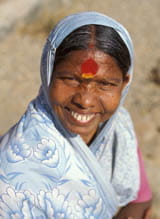by Kuki Rokhum.

Articles
How to spell freedom
Jasaiah Akhande is 21 years old and lives in Panchdongri village. Like many Korku girls from poor families, she had no education
2005 Available in French, English, Spanish and Portuguese

Photo: Jim Loring/Tearfund
We did not even ask her name – we were too busy listening to her talk excitedly about the difference literacy classes had made to her life. I could not stop smiling as I listened to her. She was just an ordinary woman from the Korku tribe in a remote part of India. As someone who had spent her life putting her thumbprint on documents that needed her signature, she was very proud of her new literacy skills. Now she can sign her name, and she never needs to ask what number the bus is when she goes to town on market day. She told us how confident this had made her.
She is one of many who attend the adult literacy classes conducted by EFICOR. The Korku people live in isolated villages in the forests of Maharashtra in west India. Most are poor labourers or subsistence farmers. Literacy is not often seen as a priority here, particularly for women. However, these literacy classes are slowly transforming people’s lives.
Jasaiah Akhande is 21 years old and lives in Panchdongri village. Like many Korku girls from poor families, she had no education. Her life changed when EFICOR started adult literacy classes in her village in 2001, after raising awareness of the benefits of being literate. She enrolled even though her parents thought it was a waste of time. Jasaiah was determined to learn and attended the classes regularly. She completed the nine-month course and gained good marks in the final examination. Her learning skills and determination surprised even the trainer. Now she could read, write and do simple mathematical calculations.
Inspired by this, she enrolled in a high school far away from her village. Her parents’ disapproval and her poverty did not prevent her from pursuing her dream. She took a loan from a savings group in her village who were willing to invest in her, seeing her keenness, confidence and determination. She studied hard and was fifth in her class in the annual examination.
While at school she also took tailoring lessons and is now starting her own tailoring business. Jasaiah’s literacy skills and education have given her great confidence. She is now able to keep accounts and avoid being cheated.
Learning at all ages
Signing your own name, recognising a bus number, handling cash and keeping simple accounts – these are all quite easy tasks for people who had the opportunity to study as children. For women like Jasaiah and Nausiben (see case study above), these skills have enabled them to break out of the frustration and exploitation that often results from a lack of literacy. Many women like them go on to lead self-help groups, where they keep the minutes and accounts themselves.
Their enthusiasm is evidence of the impact that literacy has made in their lives.
Kuki (Lalbiakhlui) Rokhum is an Interserve Partner working with EFICOR as Co-ordinator of Donor Relations. Her address is: EFICOR, 308 Mahatta Tower, B Block Community Centre, Janakpuri, New Delhi – 110 058 India.
E-mail: [email protected]
Website: www.eficor.org
Case study: Literacy and confidence
Nuasiben Gansibhai is a mother of five children living in Halmudi, Gujarat. Her eldest son runs a small shop. When he is away, Nausiben looks after the shop. However, she had difficulty dealing with cash transactions and could not travel alone to get supplies. She was greatly frustrated by this. She eagerly joined EFICOR’s literacy classes, in spite of others mocking her.
Nausiben is now a changed person. She says, ‘I feel great, now I can do things on my own. I can read, write, keep accounts and run the shop without much difficulty. I really thank God for this opportunity.’
Similarly Tagged Content
Share this resource
If you found this resource useful, please share it with others so they can benefit too.

Subscribe to Footsteps magazine
A free digital and print magazine for community development workers. Covering a diverse range of topics, it is published three times a year.
Sign up now - Subscribe to Footsteps magazine



